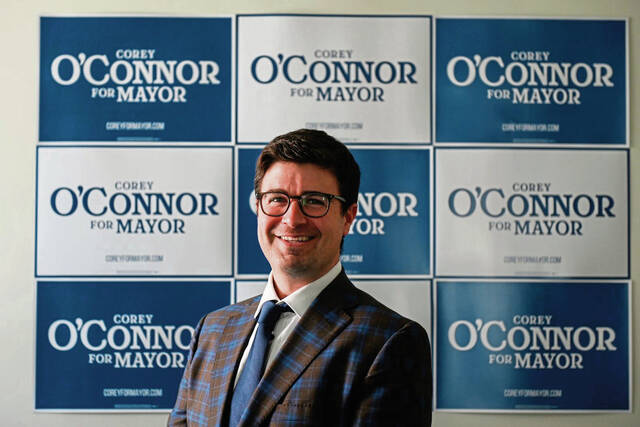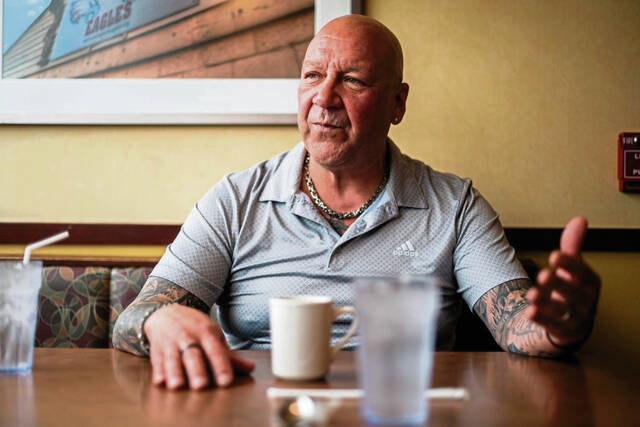O'Connor far outpaces Moreno in fundraising ahead of Pittsburgh mayoral election
With Pittsburgh’s mayoral race less than six weeks out, new reports show Democratic candidate Corey O’Connor holding a tremendous fundraising advantage over Republican nominee Tony Moreno.
O’Connor has about $270,000 to spend ahead of the November 4 election — more than 60 times what Moreno has.
Campaign finance reports filed this weeks show Moreno with about $4,000.
O’Connor — the Allegheny County controller and former City Council member — steadily outraised incumbent Mayor Ed Gainey before winning the Democratic primary in May.
Moreno, a retired city police officer making yet another run for mayor, handily defeated his opponent in the Republican primary but has struggled to keep pace in fundraising.
O’Connor’s campaign topped $1 million in fundraising before the primary, while Moreno’s war chest never reached $10,000, campaign finance reports show.
Alison Dagnes, a political science professor at Shippensburg University in central Pennsylvania, said it’s not uncommon for one candidate to pull away from another in terms of fundraising. But she said it is unusual for a candidate to lag as far behind as Moreno.
“What is surprising with these numbers is how absolutely miniscule Moreno’s is, how little he has,” she said. “$4,000 is nothing.”
But Moreno told TribLive he’s not worried.
“We are okay where we’re at,” he said Thursday. “We expected this.”
Moreno said he has more fundraising planned in the final weeks before the Nov. 4 election, and he intends to use the cash he does have to pay for advertising.
“The people of the city of Pittsburgh are going to vote for me and completely wipe out the notion that you need $1 million to be the mayor of Pittsburgh,” Moreno said.
Nothing for granted
Pittsburgh is a Democratic stronghold that has not elected a Republican mayor in nearly a hundred years. In the May primary, over 60,000 Democrats voted in Pittsburgh’s mayoral race, compared to fewer than 4,700 Republicans.
It’s not surprising the candidate representing the more popular party in the area would have an edge, said Chris Borick, a political science professor at Muhlenburg College.
“Campaign finance doesn’t always determine the outcome of an election, but it’s highly correlated with eventual winners and losers,” Borick said. “Money doesn’t guarantee anything, but if you’re trying to reach voters in a big city, you’re going to have to do some communication efforts that cost money.”
O’Connor said he’s not taking the general election for granted, despite his financial advantage.
“I think we’re building off the momentum we had in the primary and building a coalition out from supporters in the primary, bringing neighborhoods, the whole city under one vision of growth and opportunity,” O’Connor said.
‘Skin in the game’
His campaign has been buoyed by donations of $5,000 — the maximum allowed amount — from groups like the Fraternal Association of Professional Paramedics Political Action Fund, the International Brotherhood of Electrical Workers Local Union No. 5, and political action committees affiliated with the Greater Pennsylvania Carpenters, the Greater Pittsburgh Chamber of Commerce and Highmark.
During the most recent reporting period — which spanned June through part of September — O’Connor raised nearly $378,000. Of that, nearly $19,000 came from donations under $250.
A March campaign finance report tallied over $40,000 in small donations for O’Connor.
Smaller donations, Dagnes said, represent average voters who are likely to show up at the polls because they donated to a candidate.
“What candidates up and down the ballot have to do is get people to the polls on Election Day to vote,” Dagnes said. “And if you donated $5, you’re going to vote. You have skin in the game.”
O’Connor’s massive fundraising edge, Dagnes said, isn’t just about having more money to pay for staffers and ads. It also signals to voters that he’s a serious candidate who can run a well-organized campaign that energizes voters.
“The money almost becomes a symbol — a symbol of popularity, a symbol of enthusiasm, a symbol of viability,” Dagnes said.
Julia Burdelski is a TribLive reporter covering Pittsburgh City Hall and other news in and around Pittsburgh. A La Roche University graduate, she joined the Trib in 2020. She can be reached at jburdelski@triblive.com.
Remove the ads from your TribLIVE reading experience but still support the journalists who create the content with TribLIVE Ad-Free.


